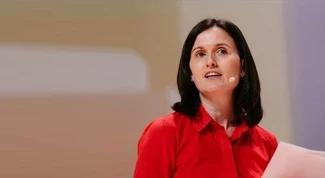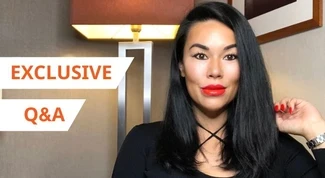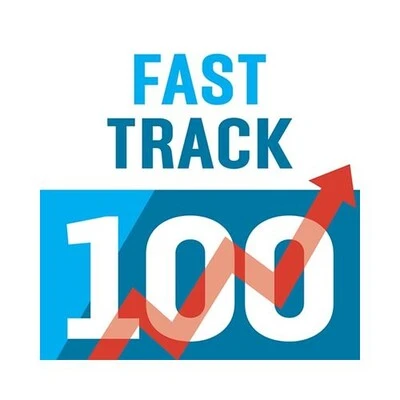In this official Q&A with Nicky Moffat, the highest-ranking woman in the British Army, we learned what it takes to be a good leader, how to manage change and what Nicky learned from her role in the Forces. A truly insightful and candid interview, it was a pleasure to sit down with such a prominent voice on workplace inclusion and high-performance teams.
This exclusive interview was conducted by Megan Lupton, a Senior Content Executive at Champions Speakers. Megan specialises in female-focused content and is particularly passionate about interviewing global leaders, like Nicky Moffat.
Q: What is the most important quality of a leader?
Megan: "You are a popular leadership speaker – can you impart some wisdom on important leadership skills?"
Nicky: "One of the important qualities in a leader is emotional intelligence, the ability to recognise that people process things in different ways and therefore, find ways to bring those people on board. There are always going to be some people that have the same thinking and motivations that I might have as a leader, but just because the others don't it doesn't mean they're not great employees!
"It just means that I've got to find another way to reach them, to give them time to process the change and then to encourage them to come on board with the journey. And of course, sometimes people who take longer to process change are busy reflecting and thinking about change in a way that might be different to me. They can come up with points, ideas, and things that can actually make change go better because they have different perspectives.
"When we talk about diversity, it's not just about Black, White, gay, straight, male, female and so on. It's about people who lead differently, react differently or think differently."
Q: What is your top tip for leading and managing transformational and cultural change?
Megan: "Businesses over the last two years have faced unprecedented change, what are your top tips for managing this?"
Nicky: "Change impacts people in different ways. Some people will respond with shock, panic, fear or paralysis, whereas others will be more forward-leaning. Now, my response to change is very forward-leaning. I like to think about what the change might mean for my organisation, and what it might mean for my people.
"Additionally, the right support in terms of training and upskilling - a leader must develop that understanding amongst their people. I think this is the key thing about change.
About 70% of change programmes fail not because of the strategy or vision, but they fail because they're not implemented, or they're not resourced. “The more you get people at each level of the organisation to engage with and also to own the change, then the greater chance you have of getting your change through - you can't impose change from above.”
Q: What advice can you give businesses on how to build high-performing teams?
Megan: "We have interviewed experts in high-performance teams, including sports stars, but your experience in the military supplies a unique insight…”
Nicky: "Building a high-performing team starts with the leader. I often refer to something called Mission Command, it's from the Prussian Chief of Staff many, many years ago. "I can simplify it into three key areas: firstly, it's about clarity of direction. A leader must have a clear vision and give direction on what needs to be done by the organisation.
"People must properly understand what's being asked of them and why."
"Secondly, you need to have an environment of mutual trust, where I trust my teams to go and deliver what I've set out. They also must trust that they can come to me if there's, for example, a lack of clarity or insufficient resource.
“And the third thing is true and full empowerment. So, building a high-performing team, if I use Mission Command, is about clarity of direction in an environment and culture of mutual trust, where people are genuinely empowered."
Q: During periods of stress, how do you find the motivation to persevere?
Megan: "Stress awareness is a vital topic of conversation in business, as it dictates employee performance. In the military, I imagine that is no different…"
Nicky: "I think one of the things that bring on stress is a loss of control.
"What happens to me - and maybe this is one of the reasons why a career in the army was perfect for me - when I'm under stress, the adrenaline kicks in, in a positive way. So I want to engage with it, whatever that thing is that’s stressing me, I want to make a plan. I try to be logical and to think through how to turn a bad situation, into a better situation.
"What I'm effectively doing is I'm trying to gain some semblance of control. And in terms of ownership, I'm trying to own the solution to the problem that I'm experiencing. But I thrive on responsibility, I think I do my best work when I'm under pressure and some element of stress. Sometimes I'll inspire that by working late to a deadline rather than perhaps starting things earlier!
"And again, it's important to know yourself, because if by doing that I'm stressing somebody else who processes things differently, then I need to be aware of that. That’s a key part of emotional intelligence.”
Q: What was the biggest challenge you faced in the military and how did you overcome it?
Megan: "In previous interviews with military figures, like Ollie Ollerton, we have heard the many challenges faced in the Forces – what is the biggest challenge you have personally overcome?"
Nicky: "The biggest challenge, I would say, was actually facing my own demons. 'When I was a young captain, I would have been around 27 as I joined the army in 1985, it was very much designed by men for men. So, it wasn't until I was a captain, and I was on this career course that I started to feel a loss of confidence.
"Inevitably part of that was because the environment around me was different to me. It was very, you know; it was a male-dominated environment. “I found as I sat around the syndicate room table, nine men and me, I start to feel a degree of intimidation, not from the men, but from the environment.
“I had to establish myself as a credible and capable military officer, but there were a number of challenges I faced.”
“The first thing was that I, for whatever reason, felt they knew more than I did. Part of that was because they had much wider opportunities within the Army, they could serve in the engineers and the gunners and the infantry and so on. I, at the time, was limited to personnel and administrative roles.
“So, I went away and developed my knowledge so when I came in the following week, I could genuinely contribute to the syndicate discussions. Knowledge absolutely helped me transform the way I was feeling, it gave me more confidence every time I contributed or asked a question.
“It grew my confidence. It grew my credibility within the group. And then, of course, it became this marvellous, virtuous cycle of things getting better and better and better.
Q: What was the biggest life lesson you learnt in the military?
Megan: “And finally, can you sum up what the British military taught you…”
Nicky: “I think in terms of life lessons, again, this was something that came to me over time, and I actually think it's about self-care. What military people tend to be, not just because it's ingrained in us and in our training, is very mission-focused, hugely focused on developing our teams and the individuals within it. So we expend a huge amount of our energy on other people.
“And I think it took me some time to realise later on in my career, when I was a Colonel, that I was pushing myself too hard. I remember a particular job when I was working in the Ministry of Defence, I was really focused on helping to create ministerial endorsed and funded policies that would support our troops on operations.
“And, of course, that's a really important task. But I put so much energy and effort into that, that I would go home at the weekend exhausted and tired.
“So the biggest life lesson is that if you're going to be a good leader or deliver your best in any role, then you've got to be match fit. And I was most match fit when I made sure I got the balance right between the energy and effort that I was expending on my work and [making time for] rest, recuperation, decompression and some time out.”
“So the biggest life lesson is that if you're going to be a good leader or deliver your best in any role, then you've got to be match fit. And I was most match fit when I made sure I got the balance right between the energy and effort that I was expending on my work and [making time for] rest, recuperation, decompression and some time out.”
Book Nicky Moffat
Contact the Champions Speakers agency to provisionally enquire about Nicky Moffat for your event today. Simply call a booking agent on 0207 1010 553 or email us at [email protected] for more information.









